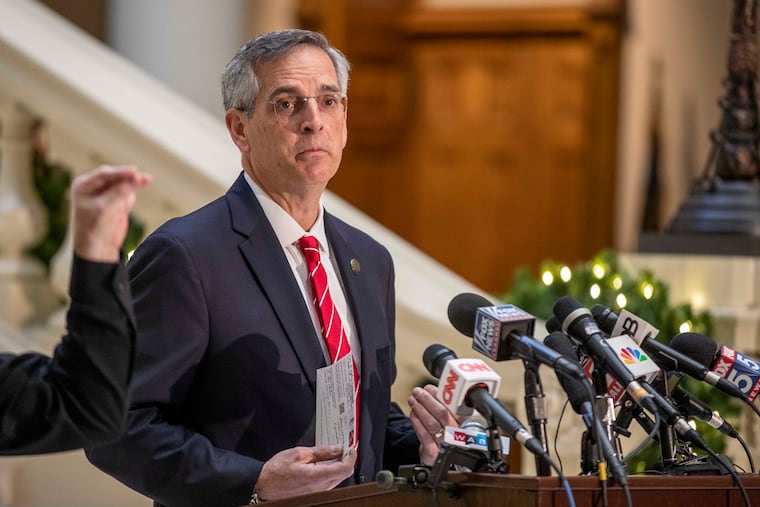Georgia will recertify election results, confirming Biden’s victory
“We have now counted legally cast ballots three times, and the results remain unchanged,” Secretary of State Brad Raffensperger said Monday.

ATLANTA — Georgia’s top elections official said his office plans to recertify the state’s election results Monday after a recount requested by President Donald Trump confirmed once again that Democrat Joe Biden won the state.
“We have now counted legally cast ballots three times, and the results remain unchanged,” Secretary of State Brad Raffensperger said during a news conference at the state Capitol.
Georgia law allows a losing candidate to request a recount if the margin between the candidates is within 0.5%. Trump requested the recount after the results certified by Secretary of State Brad Raffensperger showed that Biden led by a margin of 12,670 votes, or 0.25% of the roughly 5 million ballots cast.
During the recount, which was done using scanners that read and tally the votes, there were discrepancies in vote totals in some counties. Since the results of a recount become the official results, those counties had to recertify their results.
The secretary of state’s office was still waiting Monday on one county — Coffee County in south Georgia — to recertify its results. Once that’s done, the secretary of state plans to recertify the statewide results, and then the governor will have to recertify the state’s slate of 16 presidential electors.
The recount was the third tally of votes in the presidential race in the state. After the initial count following Election Day, Raffensperger selected the presidential race for an audit required by state law. The tight margin meant the audit required the roughly 5 million votes in that contest to be recounted by hand, he said. That count also affirmed Biden’s victory.
Also Monday, a federal judge dismissed a lawsuit filed on behalf of would-be Republican presidential electors by former Trump lawyer Sidney Powell. The suit alleged widespread fraud and sought to decertify the results of the presidential race in Georgia, among other things.
In the lawsuit, “the plaintiffs essentially ask the court for perhaps the most extraordinary relief ever sought in any federal court in connection with an election. They want this court to substitute its judgment for that of 2 and a half million Georgia voters who voted for Joe Biden and this I am unwilling to do,” U.S. District Judge Timothy Batten as he dismissed the suit following a hearing.
Separately, an election challenge filed Friday by Trump, his campaign and Georgia Republican Party Chairman David Shafer was rejected by the Fulton County Superior Court because the paperwork was improperly completed and it lacked the appropriate filing fees.
Even as lawsuits filed by Trump and his allies have been rejected around the country, the president has continued to make repeated baseless claims of widespread fraud. In Georgia, he has rained criticism on Raffensperger and Gov. Brian Kemp, both fellow Republicans. Raffensperger, meanwhile, has been steadfast in his defense of the integrity of the election in the state and Kemp has said he has no power to intervene in elections.
“I know there are people that are convinced the election was fraught with problems, but the evidence, the actual evidence, the facts tell us a different story,” Raffensperger said during the news conference Monday.
Hours before coming to Georgia for a rally Saturday night, Trump called Kemp and asked him to call a special legislative session. The governor declined.
In a tweet Sunday, Trump criticized Kemp and Lt. Gov. Geoff Duncan for inaction and again called for a special session.
After four Republican state lawmakers on Sunday also requested a special session, Kemp and Duncan put out a statement saying that convening a special session to select a different slate of presidential electors would not be allowed under state or federal law.